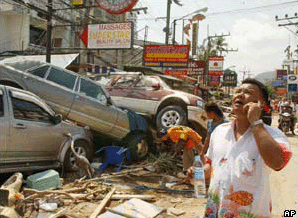Tsunami death toll rises to 23,500
2004 12 27
 The death toll from the southern Asia earthquake rose dramatically today, with some reports estimating that 23,500 people had died in the resulting tidal waves. The death toll from the southern Asia earthquake rose dramatically today, with some reports estimating that 23,500 people had died in the resulting tidal waves.
As a huge aid mission swung into action, rescue workers are still assessing the aftermath of the world's worst earthquake in 40 years. Experts warned that another quake might strike at any time.
Officials in Sri Lanka announced that the death toll in that country, which was the worst hit, had increased by 5,000 to 12,000, including 200 foreigners.
There have been fatalities in eight countries, including as far away as Somalia on Africa's eastern coast. But the worst hit areas are Sri Lanka, Indonesia and India, with each country reporting thousands dead.
In Thailand, where many British tourists were holidaying, officials said more than 2,000 people have been killed by the tsunami. In total, eleven Britons are confirmed dead - eight in Thailand, one in Sri Lanka and two in the Maldives. Some 10,000 British tourists are thought to be in the region.
Tectonic plates shifted six miles under the sea off the west coast of the Indonesian island of Sumatra, triggering a huge tsunami tidal wave which crashed on to beaches, leaving devastation behind it.
The 20-foot-high waves swept away ferries and fishermen, cars and cottages, sunbathers and holiday divers. Dramatic footage filmed by a tourist on a balcony showed waves crashing into a hotel, flooding over a swimming pool and the lower floors.
Millions of people have been left homeless and many thousands are missing following the quake, which registered 8.9 on the Richter scale. The US Geological Survey said were at least six powerful aftershocks.
Signs of carnage in the disaster area were everywhere today. Dozens of bodies still clad in swimming trunks lined beaches in Thailand.
Villagers in Indonesia picked through destroyed homes amid the smell of rotting corpses, lacking any dry ground to bury the dead. Helicopters in India rushed medicine to stricken areas, while warships in Thailand steamed to island resorts to rescue survivors.
About 200 people were evacuated from devastated Phi Phi island, one of Thailand's most popular destinations for Westerners. Jimmy Gorman, 30, from Manchester, said he saw 15 bodies on the island, including up to five children and a pregnant woman. "Disaster. Flattened everything," Mr Gorman said. "There's nothing left of it." Foreign Office staff said embassy officials throughout south-east Asia were on hand to offer assistance and an emergency telephone number has been set up on 0207 008 0000.
The foreign secretary, Jack Straw, said everything was being done to give assistance but efforts were being disrupted by communications problems. mr Straw told BBC Radio 4's Today programme: "We have had a number of deaths of British nationals reported to our embassies and high commissions but they have not yet been confirmed. The numbers will be higher.
"As well as that there are obviously quite a number injured. In Phuket there are 69 British people who have been counted as injured by David Fall, our ambassador in Thailand, and his staff - they have been literally going round the hospitals.
A huge international emergency aid effort was underway, with the EU having pledged an initial £2.1m. Pope John Paul II led appeals for aid for victims and the US president, George Bush, expressed his condolences over the "terrible loss of life and suffering".
As well as the EU, the US, Japan, China and Russia were among the countries sending aid and teams of experts to the region.
Jasmine Whitbread, international director of the aid group Oxfam, warned that without swift action, more people could die. "The flood waters will have contaminated drinking water and food will be scarce," she said. The International Red Cross - which already has staff in all the affected countries - was concerned about the possible spread of waterborne diseases in the disaster area.
Emergency plans have been launched by UK tour operators to bring visitors home and transfer those in the affected areas to safer havens. British tourists arriving back at UK airports today spoke of their ordeal, with some describing how their hotels were flooded. One told Sky News: "Lots of other people were not so lucky."
Meanwhile, scientists said the death toll would have been reduced if the Indian Ocean had a network warning system for earthquakes similar to the one along Pacific Rim nations in North America, Asia and South America.
Earth Changes TV
Article From: http://www.earthchangestv.com/secure/2004/article_6052.php

|
